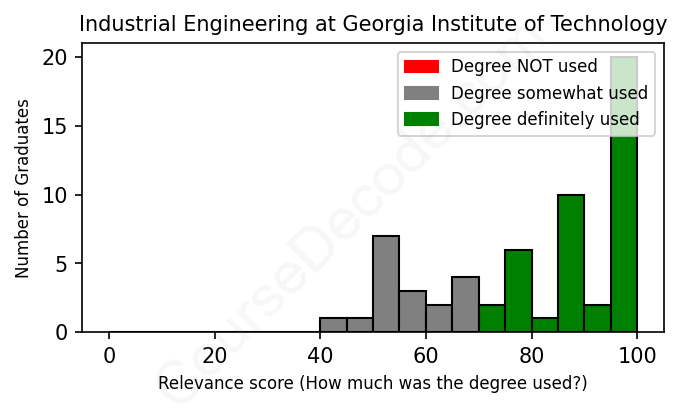
First, some facts. Of the Industrial Engineering graduates from Georgia Institute of Technology we've analyzed , here's how many have used (or NOT used) their degree in their career:

These are estimates based on AI analysis of 59 LinkedIn profiles (see below).
The verdict? Significantly above average. Overall, with an average relevance score of 80%, Industrial Engineering graduates from Georgia Institute of Technology have a much higher likelihood (+13%) of finding work in this field compared to the average graduate across all fields:
And for comparison, here's the chart for all profiles we've looked at across all degrees.
Also, after graduating, only 22% of these graduates have pursued further education other than another Bachelor's degree (such as a Masters degree or other), compared to the average across all profiles of 35%. This suggests a Bachelors degree is enough for most Industrial Engineering graduates, and it's normal to look for work straight after graduation.
See the details:
|
Relevance score: 100% We think this person has gone into a career highly relevant to their degree. We think this person has gone into a career highly relevant to their degree.
DEGREE INFOGraduated in 2021 from Georgia Institute of Technology with a Bachelor's degree in Industrial Engineering. No other secondary education since. JOB HISTORY SINCE GRADUATIONFinancial Process Improvement Intern Chick-fil-A Corporate Support Center Jun 2021 - Jan 2022 Project Specialist, Operational Financial Services  Chick-fil-A Corporate Support Center Jan 2022 - Dec 2022 Analyst III, Operational Service Management  Chick-fil-A Corporate Support Center Jan 2023 - Present ABOUTNo information provided. |
The top 10 most common jobs done by the graduates we've analyzed (ranked most common to least) are:
When looking at the various job paths taken by graduates with a degree in Industrial Engineering from Georgia Institute of Technology, several trends emerge. Most notably, many graduates tend to gravitate toward roles in supply chain management, data analysis, and consulting. Positions like Supply Chain Engineer, Data Analyst, and various managerial roles at large corporations reflect a common versatility among these graduates. They often find themselves in environments where problem-solving, optimization, and analytical thinking are fundamental to success. These job roles typically involve utilizing the skills learned during their degree, especially in areas like systems thinking and operational efficiency.
However, not all positions held by graduate alumni are closely aligned with the core principles of industrial engineering. For instance, roles such as Business Relationship Manager or various positions in IT, while requiring some problem-solving and analytical skills, often stray from the specific engineering concepts taught in their degree program. This indicates that while the Industrial Engineering background provides valuable tools, many graduates might end up in roles that don't represent the direct application of their specialized knowledge. Some jobs may focus more on management, consulting, or administrative tasks, which can sometimes limit the use of core engineering principles on a daily basis.
The overall impression is that many Industrial Engineering graduates do find jobs that leverage their education, particularly in analytics, operations, and supply chain-related positions. Yet, there remains a sizeable portion that occupies roles more aligned with general business strategies or administrative functions. In essence, while industrial engineering graduates have a strong foundation for a diverse range of careers, the relevance of their jobs to their specific degree can vary significantly. Ultimately, this speaks to the adaptability of their skills across various industries, even if not every role fully utilizes specialized engineering knowledge.
Here is a visual representation of the most common words in job titles for Industrial Engineering graduates (this is across all Industrial Engineering graduates we've analyzed, not just those who went to Georgia Institute of Technology):

When you look at the career paths of Industrial Engineering graduates from Georgia Tech, a clear picture emerges of students entering diverse fields, generally landing solid jobs right after graduation. Many graduates start their careers in roles that directly relate to their degree, such as supply chain analysts, data analysts, or engineers. For instance, graduates from 2011 to 2023 have taken positions at key companies like The Home Depot, Deloitte, Accenture, and Delta Air Lines on roles of analyst, consultant, and manager. This trend shows that most graduates kick off their careers in relevant, well-paying jobs, which is a positive indicator of the degree's value.
Fast-forward five to ten years, many of these individuals have moved into more senior positions, like managers and directors, demonstrating noteworthy progression in their careers. For example, several graduates who began as consultants or analysts at firms such as PwC and Bain & Company have climbed to senior consultant or managerial roles. Others have transitioned into leadership roles in operations and logistics, which tie back to their Industrial Engineering roots. This upward mobility reflects not only the skills learned during their studies but also the strong network and reputation Georgia Tech provides in the job market.
However, it’s worth noting that while many alumni have succeeded in carving out impressive careers, not everyone followed the same trajectory. A few individuals appear to have diverged from purely engineering or industrial roles, landing in positions like high school teachers or less specialized roles with limited relevance to Industrial Engineering. This variance indicates that while the degree provides a solid foundation, personal choices, opportunities, and at times circumstances also play a significant role in career outcomes. Still, overall, the picture is largely positive for Georgia Tech Industrial Engineering graduates, as most seem to thrive in their chosen fields, reflecting the robustness of the program.
Getting a Bachelor’s degree in Industrial Engineering at Georgia Tech is definitely on the challenging side, but it's also super rewarding if you’re into problem-solving and systems optimization. The coursework can be pretty intense, with a solid mix of math, statistics, and engineering principles and the professors expect a lot from you! It's not uncommon for students to feel a bit overwhelmed, especially with all the group projects and labs that come into play. Overall, while it's probably tougher than your average degree, if you're passionate about the field and willing to put in the work, you can totally make it through and have a great time doing it!
Most commonly, in the LinkedIn profiles we've looked at, it takes people 4 years to finish a Bachelor degree in Industrial Engineering.
So, looking at these graduates from Georgia Tech, it seems like they've landed some pretty decent gigs after finishing up their industrial engineering degrees. Many of them started off in solid roles, like analysts and consultants, and have worked their way up to positions with titles that scream responsibility, such as Directors and Senior Managers. Given the reputation of Georgia Tech and the experience these alums have, it’s safe to say they’re likely making good money, especially as they transition into senior-level roles. For instance, graduates at companies like Deloitte and PwC typically earn competitive salaries that can easily reach six figures with experience.
On the flip side, some of the earlier jobs they held, like account administrator or associate, might not have paid as well initially—think entry-level salaries. However, it's clear that many have leveraged those experiences into more lucrative opportunities over time. Even newer graduates have jumped into roles at major firms like Capital One, which usually offers solid compensation packages. Overall, it looks like most of these Georgia Tech grads are doing well financially, which is exactly what you want to see after putting in the effort to earn that degree.
Here is a visual representation of the most common words seen in the "about" section of LinkedIn profiles who have a Bachelor degree in Industrial Engineering (this is across all Industrial Engineering graduates we've analyzed, not just those who went to Georgia Institute of Technology). This may or may not be useful:

Here are all colleges offering a Bachelor degree in Industrial Engineering (ordered by the average relevance score of their Industrial Engineering graduates, best to worst) where we have analyzed at least 10 of their graduates:
| College | Score | Count |
|---|---|---|
 Iowa State University Iowa State University
|
88 | 11 |
 North Carolina State University North Carolina State University
|
87 | 12 |
 California Polytechnic State University-San Luis Obispo California Polytechnic State University-San Luis Obispo
|
87 | 15 |
 Texas A&M University Texas A&M University
|
83 | 39 |
 Purdue University Purdue University
|
81 | 36 |
 University of Central Florida University of Central Florida
|
80 | 23 |
 Georgia Institute of Technology Georgia Institute of Technology
|
80 | 59 |
 Penn State University Penn State University
|
79 | 16 |
 Texas Tech University Texas Tech University
|
79 | 10 |
 University of Pittsburgh University of Pittsburgh
|
79 | 15 |
 University of Washington University of Washington
|
78 | 12 |
 University of Arkansas University of Arkansas
|
78 | 11 |
 University of Wisconsin-Madison University of Wisconsin-Madison
|
76 | 13 |
 University of Illinois at Urbana-Champaign University of Illinois at Urbana-Champaign
|
73 | 15 |
 West Virginia University West Virginia University
|
71 | 19 |
 Clemson University Clemson University
|
69 | 23 |
 University of Florida University of Florida
|
64 | 11 |